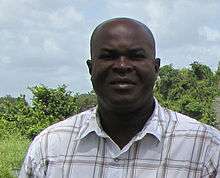Ronnie Brunswijk
| Ronnie Brunswijk | |
|---|---|
 | |
| Born |
7 March 1961 Moengotapoe, Suriname |
| Nationality | Surinamese |
| Political party | General Liberation and Development Party |
Ronnie Brunswijk (born March 7, 1961) is a Surinamese ex-rebel leader, politician, and business man. After having served in the early 1980s as the personal body guard of Dési Bouterse, who overthrew the government in 1980 in a military coup, Brunswijk left him and formed the Surinamese Liberation Army, better known as the Jungle Commando.
Brunswijk was seeking to gain recognition and rights for the Maroon minority of the interior, descendants of African slaves who had established independent communities in the 17th and 18th centuries. In addition, he wanted "to free Suriname from the military dictatorship." His forces fought against the national military under Bouterse in a civil war called the Surinamese Interior War. The civil war continued from 1986 to 1990, resulting in hundreds of deaths and several hundred refugees, and disruption of important mining industries. Peace was negotiated in 1991.
Brunswijk has remained active in politics, serving as chair of Algemene Bevrijdings- en Ontwikkelingspartij (ABOP, General Liberation and Development Party), and as a representative in the National Assembly. In addition he is a player/owner of Marowijne football club Inter Moengotapoe
Moiwana masscre
After war broke out, on 29 November 1986 the Surinamese army attacked Brunswijk's home village of Moiwana, where they murdered at least 39 villagers, mostly women and children. They burned down Brunswijk's house and destroyed the village.[1] More than 100 refugees fled across the border to French Guiana, which became a destination for other refugees as the war wore on. The Inter-American Court of Human Rights ordered the government to pay millions of dollars (US) in compensation to the 130 survivors of the village attack.
Post-war activities
The government and Brunswijk finally negotiated a peace in 1991 that included conversion of the Jungle Commando to a regular part of the Surinamese Army, with responsibility for patrolling their traditional interior territory. The government also promised jobs for Maroons in gold prospecting and forestry, as they were isolated from many developing industries.
The Netherlands prosecuted both Brunswijk and Bouterse in absentia for drug trafficking, and both men were convicted. Brunswijk was convicted in absentia in the Netherlands to six years imprisonment for cocaine smuggling by a Dutch court in Haarlem. He has an international arrest warrant issued against him.[2]
Brunswijk is chairman of the Surinamese political party ABOP (Algemene Bevrijdings- en Ontwikkelingspartij), which has three seats in the parliament. Brunswijk occupies one of them.
Brunswijk is also a player and owner of Marowijne football club Inter Moengotapoe. In 2002, Brunswijk built a football stadium in Moengo, which he named the Ronnie Brunswijkstadion. The disciplinary committee of the Surinamese Football Association suspended him for five years because he threatened some players with a handgun during a match in 2005. The suspension was retracted due to lack of evidence. In June 2012, Brunswijk was suspended for 1 year because he behaved violently towards the referee and a player in football match.
In December 2007, Brunswijk beat up Rashied Doekhi in the Surinamese parliament. Doekhi is a member of Desi Bouterse's party and he insulted Paul Somohardjo, then chair of the Surinamese parliament.
Family
Ronnie Brunswijk's nephew Clyde Brunswijk is a professional kickboxer.[3]
References
- ↑ NRC Handelsblad - Brunswijk wijst graf aan van moorden bij Moiwana
- ↑ DePers.nl - "Maar hoe zit het met Ronnie Brunswijk?"
- ↑ "Mixfight in gesprek met SuperKombat vechter Clyde-Brunswijk" (in Dutch). MixFight. 23 September 2014.